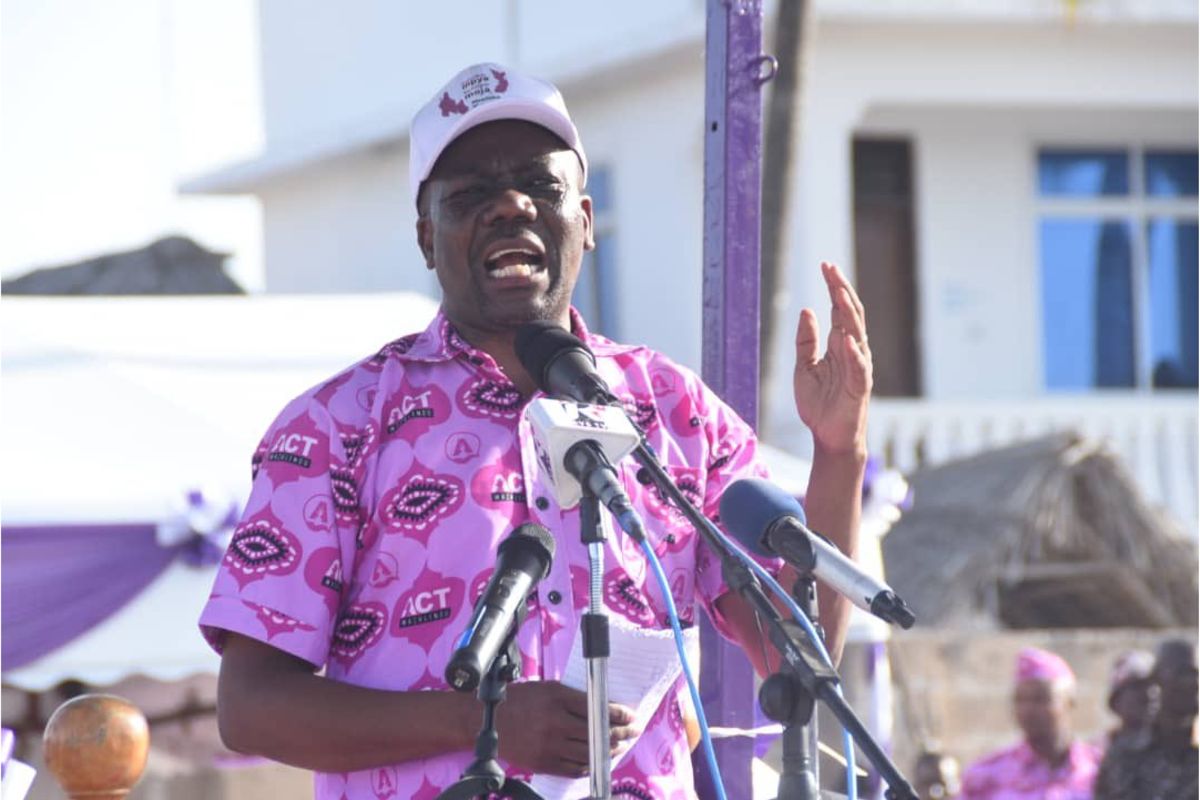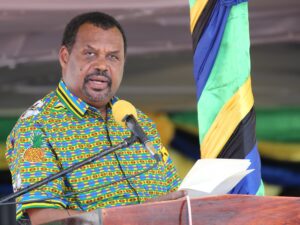
Dar es Salaam. The leader of the ACT Wazalendo, Zitto Kabwe has raised three key issue that he said are hindering the economy of the islands and wants the authorities to investigate them.
He named the issues as poor efficiency in the operation of the Port of Zanzibar, the violation of the competition law in the operation of the Amani Abeid Karume Airport and investment decisions in the Zanzibar Social Security Fund (ZSSF).
Kabwe was addressing thousands of ACT-Wazalendo supporters who were gathered at a public rally in Nungwi Zanzibar, the rally was the first since the ban on political rallies was lifted.
“The pillars of Zanzibar’s economy are the port and the airport, because two-thirds of the economy depends on trade and tourism. In the absence of efficiency in these areas, the cost of living for the people of Zanzibar must go up,” he said.
According to Kabwe, at Zanzibar port a 40-foot container is charged $7,000, while in other areas it is $2,000 and $1,500 on Tanzania Mainland
This he said has forced business people to shift to other ports as a result making the cost of living shoot up.
Apart from the operational challenges, Zitto expressed surprise at the lack of investment in the port for 60 years.
“We are calling on the President of Zanzibar (Dr. Hussein Mwinyi), if it really hurts him, to dissolve the board of the Port of Zanzibar, remove the management and find Zanzibari people capable of running it according to their environment,” he said.
However, he also spoke of rumors that the port is expected to be leased to the UAE instead of being improved as promised by CCM.
He then touched on the challenge in the operation of the Abeid Karume Airport, saying it is surprising that an investor from Dubai exclusive rights to run the newly built Terminal 3 building at the cost of the previous local investors
As a result he said some 2000 jobs for the Zanzibari people has been lost. According to him it is not that their party is against competition, instead, they want an equal playing field for both local and foreign investors.
“The laws of the United Republic do not allow one company to have a monopoly in one business area, the Zanzibar Airport Authority has exercised monopoly against the law,” he said.
Ground handling laws as enacted by TCAA prevents any airport to have a single hound handler, prevents monopoly and prevents restriction of terminals.
The out spoken politician also raised the issue of an investment decision by ZSSF, saying it threatens to lose the funds of the members.
“Currently, Zanzibar has one social security fund, but the investment decisions that are made are surprising. The projects that are being carried out, you would think that there is no board of trustees… if you are not careful these young people who are contributing today, after they reach the age of Mzee (Juma) Duni, there will be no pension to pay them,” he said.
He called on the CAG of Zanzibar to conduct a special audit of all investments made by the fund.
He gave an example of the investment made between ZSSF and CCM that even its members do not contribute to the fund, instead contribute to NSSF.
“ZSSF has entered into a partnership with CCM to for a project, an entity that is not a member of this fund what if they run away with money? These are the things we want the CAG to audit, but we want the fund’s regulator (the Central Bank of Tanzania) to look at the fund’s investment policies to protect its members’ funds,” he said.
Share this news
This Year’s Most Read News Stories

Tanzania Declares Marburg Outbreak – Africa CDC Mobilizes Immediate Response

Addis Ababa, January 20, 2025</Strong> — Tanzania has declared a Marburg virus disease (MVD) outbreak after confirming one case and identifying 25 suspected cases in the Kagera Region of Northwestern Tanzania. The Marburg virus, a highly infectious and often fatal disease, is similar to Ebola and is transmitted to humans from fruit bats and monkeys. This outbreak marks the nation’s second encounter with the deadly virus, following the outbreak in Bukoba District of Kagera Region in March 2023, which resulted in nine cases and six deaths.
In response to this urgent threat, the Africa CDC is mobilizing strong support to help Tanzania contain the outbreak. A team of twelve public health experts will be deployed as part of an advance mission in the next 24 hours. The multidisciplinary team includes epidemiologists, risk communication, infection prevention and control (IPC), and laboratory experts to provide on-ground support for surveillance, IPC, diagnostics, and community engagement.
The Director-General of Africa CDC, Dr. Jean Kaseya, has engaged with Tanzania’s President Samia Suluhu Hassan and the Minister of Health to ensure coordinated efforts and secure political commitment for the response.
“Africa CDC stands firmly with Tanzania in this critical moment. To support the government’s efforts, we are committing US$ 2 million to bolster immediate response measures, including deploying public health experts, strengthening diagnostics, and enhancing case management. Building on Tanzania’s commendable response during the 2023 outbreak, we are confident that swift and decisive action, combined with our support and those of other partners, will bring this outbreak under control,” Dr. Kaseya stated.
Africa CDC has recently supported efforts to enhance the diagnostic and sequencing capacity of public health laboratories in Tanzania. PCR Test kits and genomic sequencing reagents have been dispatched, with additional supplies in the pipeline. To ensure rapid identification and confirmation of cases, the institution will also provide technical assistance to strengthen detection and genome sequencing for better characterization of the pathogen. Additionally, support will be provided to improve case management protocols and enhance the capacity to deliver safe and effective treatment.
Africa CDC is committed to working closely with the Government of Tanzania, regional partners, international organizations, and global stakeholders, including the World Health Organization, to stop the spread of the Marburg virus.
Source: allafrica.com

The reason internet speeds in Tanzania still lag behind
Vodacom Tanzania was placed 16th at 17. ’08 Mbps, while Airtel Tanzania was ranked 18th available on 12. 89 Mbps.Continue Reading

ZSSF money not for projects, says Ali Karume
Unguja. Veteran politician and diplomat Ali Karume has called on authorities of the Zanzibar Revolutionary Government (SMZ) to refrain from using the Zanzibar Social Security Fund money for establishing commercial projects.Continue Reading










